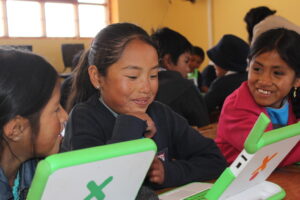Hear from our grantee – Age Check Certification Scheme
Why Age Assurance is key to empowering children in the digital age

What is Age Assurance and why is it important?
Age assurance encompasses the process of establishing, determining, and confirming age-related attributes, including verification, estimation, and inference. For instance, a social media platform may require users to provide a valid identification document to prove their age before granting access to content intended only for adults, like dating services. This process is crucial for child safety, as it prevents children from accessing potentially harmful material and helps maintain a secure online environment conducive to healthy development.
Global Age Assurance Standards Summit - Affirming the Possibility of Age Assurance
In the United Kingdom, between 8th and 12th April, we hosted a Global Age Assurance Standards Summit, in collaboration with British Standards Institution (BSI) and supported by Safe Online. The Summit was attended by over 700 interested parties including governments, regulators, international organisations, civil society, academia, industry, age assurance service providers, standards developers and technical experts.
The summit’s headline boldly declared: “Age Assurance Can Be Done.” This statement underscores the belief that, with the right processes and use cases, age assurance can be deployed effectively while preserving privacy, security, and efficiency. Moreover, it emphasizes the pivotal role age assurance plays in protecting children in the digital environment, serving as a valuable tool alongside other protective measures.
Summit Communique
The Summit concluded with the development of the first-ever Communique on Age Assurance. The purpose of this document is to achieve a consensus view to reflect the position, state of the art and development of age assurance standards as of April 2024. After months of public consultation through BSI’s standards development portal, considering the input of global platforms (like Google, Meta, Microsoft and others), civil society (such as the Internet Watch Foundation, 5 Rights Foundation, NSPCC and others), regulators and many other interested parties from around the world; we were very pleased to publish the landmark document at the conclusion of the Summit.
Guiding Principles and Call to Action
The communique is anchored in a set of guiding principles and calls to action, aiming to create a robust framework for age assurance globally:
- Principle 1: Upholding Individual Rights and Best Interests: Age assurance systems should prioritize the protection and empowerment of individuals in the online environment, respecting their evolving capacities and diverse needs.
- Principle 2: Data Minimization: Systems should collect and process only the necessary personal data, ensuring minimal intrusion and preserving privacy.
- Principle 3: Transparency and Accountability: Systems should be transparent in their processes and provide mechanisms for users to access and rectify their data, fostering accountability.
- Principle 4: Cooperation and Participation: Stakeholders should collaborate across sectors to ensure the effectiveness and consistency of age assurance mechanisms while supporting innovation and research.
International Age Assurance Standards
The summit recognised the need for international standards to guide age assurance efforts. These standards are formed through ISO/IEC 27566, which are a set of global standards for how to approach building, deploying, measuring and testing age assurance systems, and are voluntary and flexible in nature and provide a common reference framework for stakeholders and promote a global, coordinated approach to child protection online.
Moving forward
The Global Age Assurance Standards Summit serves as a catalyst for change in safeguarding children’s rights in the digital age. By embracing the principles outlined in the communique and fostering collaboration across sectors, we can create a safer online environment that respects and protects the rights and best interests of children worldwide. As we reflect on the outcomes of this landmark summit, let us heed the call to action and work together to implement age assurance standards that empower children, promote privacy, and ensure a brighter, safer digital future for all.
Read the Summit Communique
Image: © Age Check Certification Scheme (ACCS)
See more stories from our family of grantees

A Major Victory for Children in Peru as Country Brings in New Law to Tackle Online CSEA
In a huge step forward to tackle online child sexual exploitation and abuse (CSEA), Peru has passed a new law which makes it mandatory for Internet service providers to inform their users about parental filters.

Malaysia Takes Pivotal Steps Towards a Safer Internet for Children Following Data From Disrupting Harm
In a landmark step forward for children’s online safety, Malaysia has made sex extortion and livestreaming of child sexual abuse distinct offenses, to enable better prosecution of these crimes.

Hear from our grantee: Age Check Certification Scheme Why Age Assurance is key to empowering children in the digital age
Hosted in collaboration with the British Standards Institution (BSI), this groundbreaking summit united over 700 global stakeholders to affirm a bold declaration: “Age Assurance Can Be Done!” With a focus on safeguarding children online, the summit produced a landmark Communique on Age Assurance, outlining principles like prioritising individual rights and data minimisation. Safe Online grantee, Age Assurance Certification Scheme, explains why age assurance is critical, the role of the first-ever Communique on Age Assurance and the way forward from this landmark Summit.




